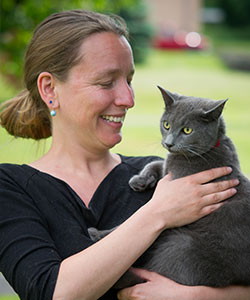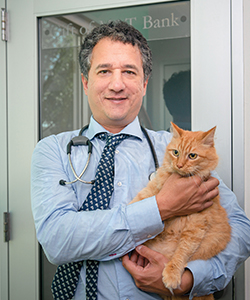2020 – 2021 Funded Research Projects
The Cornell Feline Health Center Research Grant Program provides vital financial support to Cornell researchers investigating issues that affect feline health. Projects currently funded by the Cornell Feline Health Center range from studies of feline infectious peritonitis (FIP) to finding the genetic causes of certain inherited diseases.
Scientific research has made feline medicine what it is today, and it’s making a healthier, happier tomorrow possible for cats around the world. If you believe in the positive power of our work to make a difference, please consider making a donation to the Cornell Feline Health Center today.
Characterizing microRNAs with a potential role in feline mammary cancer pathogenesis
Feline mammary cancer is the third most common tumor of cats, and carries a poor prognosis if it is not caught early. The reason for the aggressive behavior of this cancer is not completely clear, and while aggressive surgical removal of these tumors with or without chemotherapy can provide some benefit, recurrence is common, and cats with larger mammary tumors (greater than 3 cm in diameter) have a poor prognosis, with a median survival time of four to six months.
This study will characterize small ribonucleic acid (sRNA) molecules, which are involved in the control of gene expression, in the mechanisms of feline mammary cancer. Learning more about the role that these ubiquitous molecules play in the development of feline mammary cancer may reveal novel ways to exploit sRNAs in the treatment of feline mammary cancer, thereby improving outcomes in this dreadful disease.
Arianna Bartlett works in the Van de Walle lab at the Baker Institute for Animal Health, part of the Cornell College of Veterinary Medicine as a graduate student in the field of Genetics, Genomics and Development, where she takes a comparative approach, analyzing the differences between feline cells and cells of other animals. Read more about her study comparing cats and horses.
Investigators: Gerlinde Van de Walle, DVM, Ph.D. and co-investigator Praveen Sethupathy, PhD
CAR Immunotherapy to Eradicate Feline Alimentary T Cell Lymphoma
Lymphoma is a common cancer of cats that accounts for approximately 1/3 of all feline cancers. The most common form of feline lymphoma is alimentary lymphoma, which affects the GI tract, liver, and other abdominal organs and lymph nodes. Occurring as both T cell and B cell form, depending upon whether the cancer originates in B or T lymphocytes (important cellular components of the immune system), survival times for feline lymphoma currently vary between six months and two years, lymphoma can have significant negative health impacts on cats that a diagnosed with this condition.
This study is investigating the use of chimeric antigen receptor (CAR) immunotherapy to treat feline T cell lymphoma. This novel technique involves the harvesting of T lymphocytes from cats with lymphoma, genetic modification of these T cells to introduce CARs into them (this imparts the ability to recognize and neutralize cancer cells), and the reintroduction of these modified T cells into the feline lymphoma patient. CAR immunotherapy has been approved for use in human lymphoma patients, and shows promise for significantly improving outcomes in feline lymphoma patients.
This study is not yet enrolling patients.
Investigators: Cynthia Leifer, PhD with co-investigator Anthony Bais, PhD
 Uncovering mechanisms of feline lower urinary tract disease (FLUTD): Use of urine metabolomics to investigate androgen levels in cats with urethral obstruction
Uncovering mechanisms of feline lower urinary tract disease (FLUTD): Use of urine metabolomics to investigate androgen levels in cats with urethral obstruction
Feline lower urinary tract disease (FLUTD) is a common condition characterized by painful urination, inability to urinate, increased frequency of urination, inappropriate urination, blood in the urine, and/or frequent licking of the genital region. FLUTD can cause a wide variety of problems for cats, ranging from discomfort to potentially life threatening, and some studies have identified it as the most common reason that cats are brought to a veterinarian. While a number of causes have been identified for FLUTD, including the formation of stones in the urinary tract and obstruction of the urinary tract by plugs of material composed of mucous, cellular material, and minerals, in most cases, the cause remains unclear (this is termed idiopathic cystitis).
Previous studies in people with similar syndromes and in animal models suggest that androgens (hormones involved in male secondary sex characteristics and reproduction that are found in both males and females) are involved in the development of FLUTD. This study will utilize metabolomics, the study of small molecules involved in cellular metabolism, to investigate the role of androgens in the development of FLUTD using naturally occurring cases presented to the Cornell University Hospital for Animals.
Investigator: Julia P. Sumner, BVSc, DACVS
 Genome wide association studies in cats with complex diseases using a proprietary high density Illumina mapping array
Genome wide association studies in cats with complex diseases using a proprietary high density Illumina mapping array
Using DNA samples obtained from healthy cats and from cats with common feline diseases, including hypertrophic cardiomyopathy, hyperthyroidism, and diabetes, this unique and broad ranging study is investigating the genetic mechanisms of these diseases. The results of this study have strong potential to identify new ways to diagnose, treat, and prevent a wide variety of diseases that impact the well-being of cats.
Investigator: Rory Todhunter, BVSc, Ph.D.
 Role of feline calicivirus infection in cats with chronic gingivostomatitis
Role of feline calicivirus infection in cats with chronic gingivostomatitis
Feline chronic gingivostomatitis (FCGS) (inflammation of the mucous membranes of the oral cavity) is a common disease of cats; and the blisters, swelling, and sores that are characteristic of this condition can significantly impact the quality of life of affected cats. Feline calicivirus (FCV) is ubiquitous viral disease of cats that occurs in a variety of strains and that can cause symptoms ranging from upper respiratory infections to life-threatening systemic infections.
Previous studies have shown a correlation between FCGS and FCV infection, but the role of this common viral infection in the development of FCGS remains unclear. This study will investigate the role of FCV in FCGS by comparing the distribution, growth kinetics, and genetic profiles of FCV isolated from cats with known FCV strains. The improved understanding of the relationship between FCV and FCGS provided by this study holds promise of guiding the development of more effective therapeutic strategies to manage FCGS.
Investigators: Santiago Peralta, DVM, DAVDC and co-investigator John S. L. Parker, BVMS, PhD
Genomic/transcriptomic analysis of Toxocara cati, the most common parasitic nematode of cats
Toxocara cati (AKA feline roundworm) is one of the most common intestinal parasites of cats (approximately 25% of cats are believed to be infected), and the Center for Disease Control and Prevention (CDC) has identified Toxocara infections as one of the five neglected parasitic infections (NPIs) to be prioritized for study due to their potential to infect humans as well as various companion animal species (primarily dogs and cats). There are currently no drug therapies available to treat the larval stage of T cati infection, and no vaccine has been developed to prevent infection in cats.
This study will investigate the genetic profiles of T cati obtained from naturally occurring infections as the first step in the development of improved strategies to both treat and prevent T cati infection in cats.
Investigators: Dwight Bowman, PhD and co-investigator Erich Schwarz, PhD




